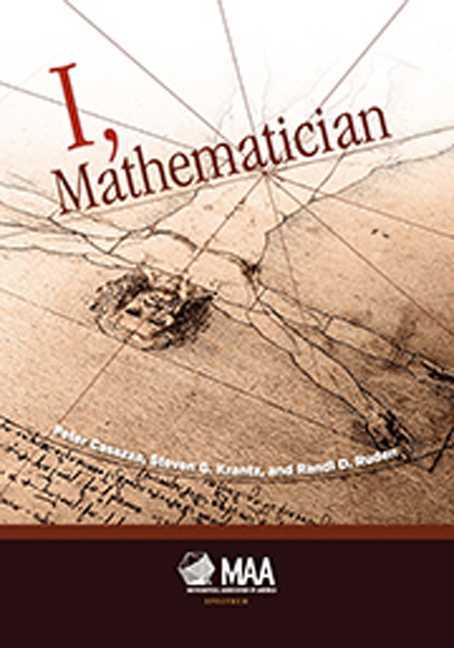Book contents
- Frontmatter
- Contents
- Preface
- Part 1 Who Are Mathematicians?
- Part II On Becoming a Mathematician
- Foreword to On Becoming a Mathematician
- 11 Mathematics and Teaching
- 12 Who We Are and How We Got That Way?
- 13 Social Class and Mathematical Values in the USA
- 14 The Badly Taught High School Calculus Lesson and the Mathematical Journey It Led Me To
- 15 The Psychology of Being a Mathematician
- 16 Dynamics of Mathematical Groups
- 17 Mathematics, Art, Civilization
- 18 Questions about Mathematics
- 19 A Woman Mathematician's Journey
- Part III Why I Became a Mathematician
13 - Social Class and Mathematical Values in the USA
from Part II - On Becoming a Mathematician
- Frontmatter
- Contents
- Preface
- Part 1 Who Are Mathematicians?
- Part II On Becoming a Mathematician
- Foreword to On Becoming a Mathematician
- 11 Mathematics and Teaching
- 12 Who We Are and How We Got That Way?
- 13 Social Class and Mathematical Values in the USA
- 14 The Badly Taught High School Calculus Lesson and the Mathematical Journey It Led Me To
- 15 The Psychology of Being a Mathematician
- 16 Dynamics of Mathematical Groups
- 17 Mathematics, Art, Civilization
- 18 Questions about Mathematics
- 19 A Woman Mathematician's Journey
- Part III Why I Became a Mathematician
Summary
Abstract. The influence of socio-economic background on the choice of mathematics as a career and the intellectual values of the mathematician is examined through the lens of the author's life experience and an informal sampling of biographies of noteworthy mathematicians.
Introduction
Having read other articles in this collection, I have seen several analyses of the psychological traits that shape a mathematician. I would like to supplement that discussion with a discussion of the social and economic backgrounds of mathematicians. Unfortunately, I do not have the background in sociology, political science, or economics to do so. I am thereby forced to fall back on the one case I know best—myself. Perhaps my experience will reflect the experience of some others in the mathematical community. My aim is to make a connection between my socioeconomic background and my views of the role the mathematical community should play in American society. The reader is invited to imagine or write a similar article about himself or herself and will, I hope, forgive my talking about myself at such length.
My Socio-Economic Background
The reflections that follow are the observations of a mathematician who grew up and worked in the United States during the last half of the twentieth century. I do not claim that they are an accurate picture of the country as a whole during this period. I have not read any scholarly studies, much less done any of my own to support what I am about to say. To keep this article from being only the ruminations of a mathematician on the brink of senility, I performed a small-scale, highly non-scholarly study of the biographies of 85 mathematicians, looking for details of their family history that would give a clue to their socio-economic class. The results of that study will be discussed in the final section of this article.
Throughout what is now becoming a long life, I have noticed some differences in basic values among members of the mathematical community. I ascribe these differences to social class. My thesis is that many scholars—and most mathematicians, it seems to me—were raised with the expectation of having a career involving intellectual activity, in homes where abstract ideas were found in books that lined the walls and were discussed at family gatherings.
- Type
- Chapter
- Information
- I, Mathematician , pp. 156 - 168Publisher: Mathematical Association of AmericaPrint publication year: 2015

